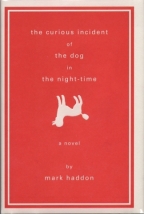the curious incident of the dog in the night-time
Doubleday/Random House
US Hardcover First
ISBN: 0-385-50945-6
Publication Date: 06-17-2003
226 Pages; $22.95
Date Reviewed: July 15, 2003
Reviewed by: Terry D'Auray © 2003
|

|
|
REFERENCES
|
COLUMNS
|
|
Mystery,
General Fiction
|
07-18-03,
06-14-04
|
Some books make you think, or think differently. Others make you
explore unknown territories. Still others make you laugh. It is the
rare book that makes you effortlessly do all three. 'the curious
incident of the dog in the night-time' happens to be one of those
books.
Mark Haddon sets himself a daunting task - to write a first person
narrative from the perspective of a fifteen-year old boy, an autistic
boy, brilliant, analytical, mathematically gifted and completely
devoid of emotion. That he succeeds is remarkable. That he creates an
emotionally moving book is truly an awesome achievement.
'the curious incident of the dog in the night-time' is the story
of Christopher Boone, an autistic boy, who sets out to write a
detective story about the killing of a neighbor's dog. His detection
leads him to uncover long-hidden family secrets and ultimately to the
shake-up of his carefully constructed, tightly controlled world. The
plot is minimal and adequate, but close to irrelevant. This is a
character driven book and the driver is solely Christopher.
Christopher is a wholly engrossing narrator. He has an
exceptionally bright and engaging mind that veers randomly in odd and
interesting directions. He's a mathematical genius who finds solace
in things numeric, countable, controllable and logical. Christopher
eagerly tells us of his terrors, his omens, his reasons for hating
yellow and brown and loving red, and exactly what he thinks of
Sherlock Holmes. He explains himself in flowcharts and formulas,
logical to him, but not always to us. Seeing four yellow cars on the
way to school makes it a Black Day, so he refuses to eat or talk.
Five red cars, on the other hand, make it a Super Good Day, when
something special is destined to happen. Christopher can be quite a
funny narrator, particularly as he puzzles through similes and
metaphors, figures of speech, or anything having to do with human
connections or emotional interactions. He works so hard, so
diligently, to frame and master what is, to him,
incomprehensible,
Haddon writes Christopher with a light touch, a matter-of-fact
portrayal that's actually not matter of fact at all. He never looses
his voice, never breaks out of his character, and it is this
consistency that swallows us into Christopher's world. As he
narrates, we begin to see things as Christopher does; we begin to
understand him, to see him as a whole child. The impact Christopher
has on those around him, the challenges faced by his parents, are
understated, set out straight forwardly, as backdrop not drama. It
all makes sense to Christopher, it is all clear and everything is
logical. It is for us, the readers, to fill in the spaces, to round
out the story.
I can't remember reading a book where I've done so much of the
work. Work I did willingly, unknowingly, without a thought. It wasn't
until I'd put the completed book aside that I realized I'd done any
work at all. I provided the emotion, the tension, and much of the
terror that make this such a compelling story. When Christopher
learns of his mother's fate, I immediately filled in the back-story
of why that was so and at what cost. When Christopher sets off for
London, on the train and then on the Tube, I steeled myself for
disaster. I supplied my own dread. When his father offers apologies
for past actions, Christopher registers it as simple words on the
page, remote and without feeling. I supplied the father's anguish.
Haddon clearly knows autistic territory and gave me an amazingly
perceptive character, a set of circumstances and made it essential
and easy for me to do the rest. Haddon provided the play-by-play; I
provided the color commentary.
Many readers will herald this book as a socially relevant,
eye-opening story that will enhance our understanding of the
challenges faced by autistic children and their parents. I also found
it an extraordinary story of an unemotional boy who becomes an
emotionally compelling character. Logic can beat back terror and
brilliance can mask a broken brain. Christopher is a dysfunctional,
but brave, boy, unhuggable but not unlovable, who clearly merits his
place in this world. He will linger with me, as I suspect he will
with others who read this book.
